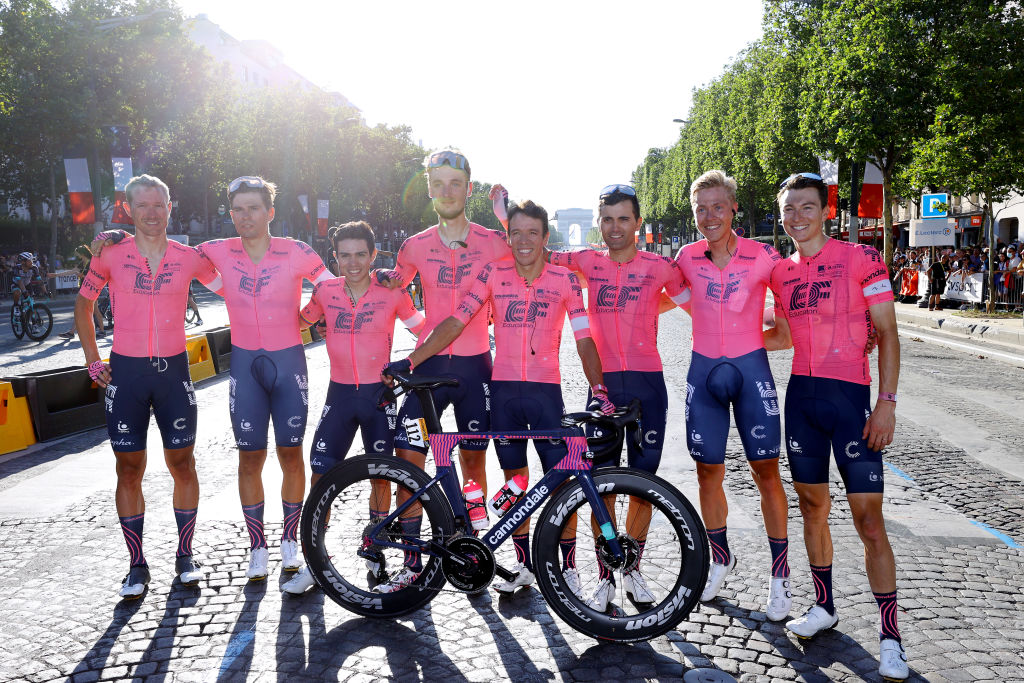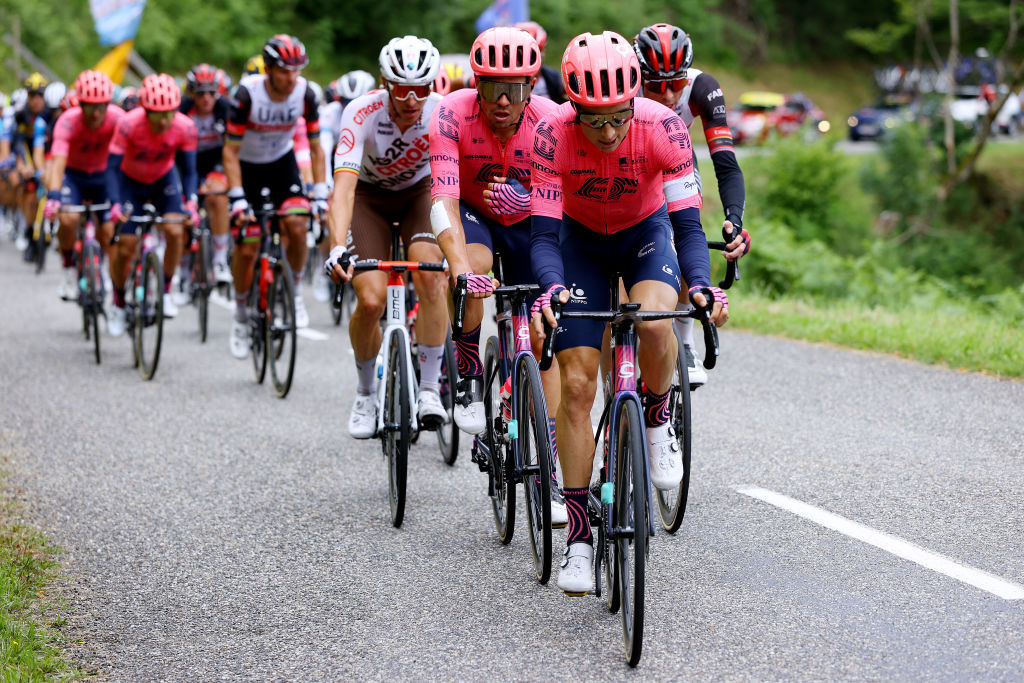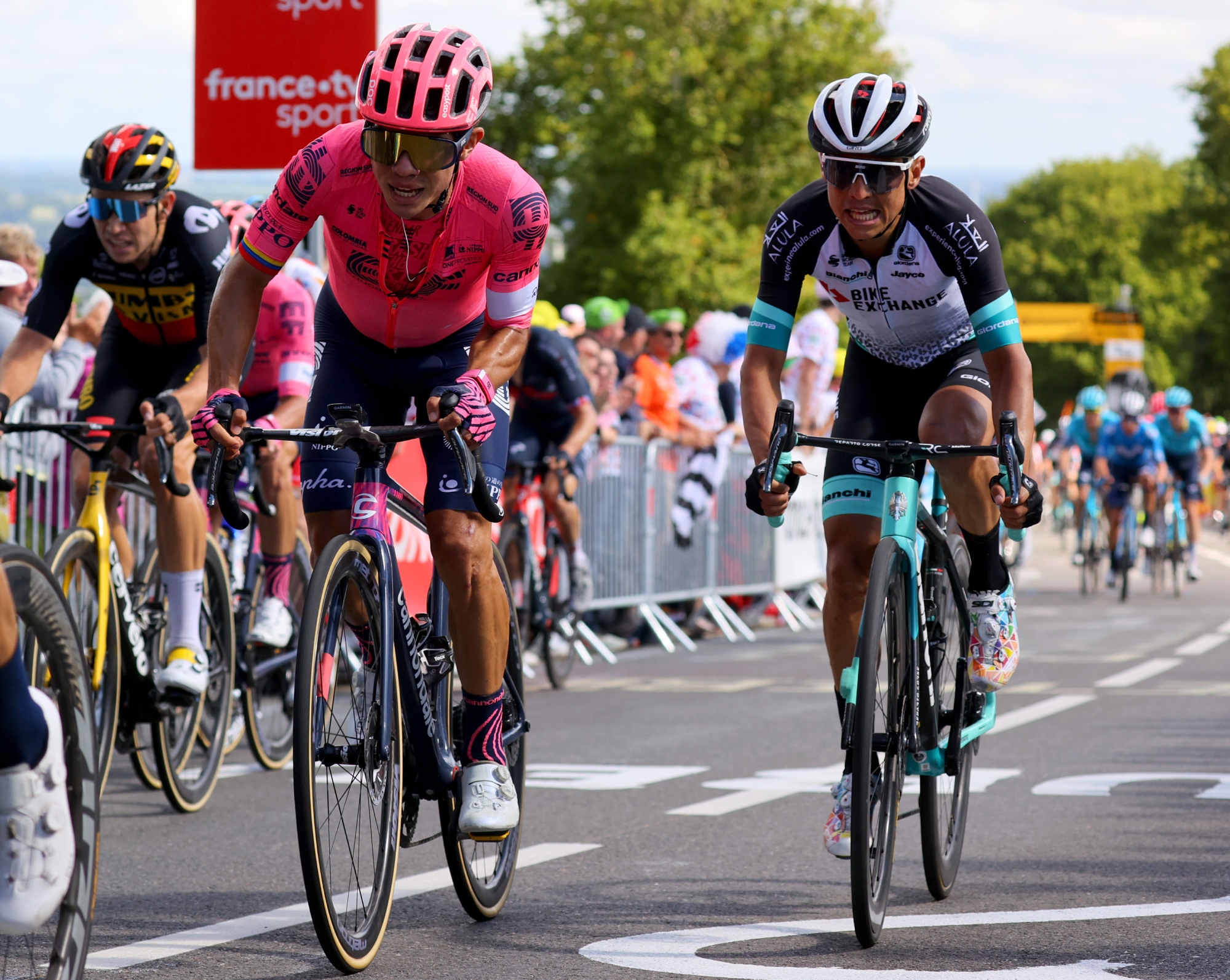Vaughters: The Tour de France was our biggest frustration of 2021
EF Education-Nippo manager runs the rule over this season and looks ahead to a continuing build-back in 2022

After several of their top names - such as Michael Woods, Sep Vanmarcke and Dani Martínez - moved on last year, 2021 was not likely to be a straightforward season for EF Education-Nippo, but that didn’t mean it would be a bad one, either.
In an extensive interview with Cyclingnews, Vaughters, now in his 15th years as a manager, covers both the highs and lows of 2021, as well as his team's goals for 2022. He concludes with a look at why EF Education have chosen this moment to become a co-title sponsor of a women’s team.
Cyclingnews (CN): What went wrong and what went right in 2021 for EF Education-Nippo?
Jonathan Vaughters (JV): Considering we had a drastically reduced budget for 2021, I can only compliment everything the riders and staff did. If it was based on wins per dollar spent [16 road victories compared to 17 in both 2020 and 2019 -Ed.], while the actual numbers are confidential, I would call it probably the most performance-efficient season we’ve ever had.
We were concerned. We’d lost a lot of our big-name riders because we had to kind of temporarily scale back a bit as COVID took a hold. People questioned whether we’d be able to replace those performances and I think we did. Now we are building back towards our 2019 budget. Stability is on the way, step by step. New sponsors like EasyPost are helping that a lot.
Also, just as a statistical/ numerical fact, we raced far fewer days in both 2020 and 2021. Because of COVID, and our medical team’s recommendation to really limit exposure, we did very few Continental-level races - probably around 60 fewer race days than most WorldTour teams. While that helped prevent our team from having COVID issues, it hurt our ranking significantly. We didn’t get points in many races, simply because we just weren’t there. But I stand by that decision and in 2022, we’ll be back.
CN: In terms of results, the two biggest down-sides compared to 2020 are arguably no Grand Tour top-three finishes, nor was there a Tour de France stage win.
Get The Leadout Newsletter
The latest race content, interviews, features, reviews and expert buying guides, direct to your inbox!
JV: The Tour was probably our most frustrating point of the year. We had a lot of third-through-to-eighth places there, and we really thought we were going to win the teams classification until Rigo [Urán, second overall for much of the race, but finally 10th -Ed.] had his bad days. But in the Tour de France, if you take a couple of those days where Magnus [Cort] or [Sergio] Higuita was third and say they had got luckier at winning, or if Rigo didn’t have his bad days, then it’s a monumentally successful race.
So I can’t just step back and say ‘the Tour de France was a failure’. There’s no point in criticising what we did because actually, as a performance and from a preparation stand-point, it was bang on. Just little things here and there didn’t go our way.
But that’s life, and conversely in the Vuelta had the bunch chased two minutes earlier than they did, the breaks [with Magnus Cort in them] would have got caught. So we had good luck. It’s more a question of how well did you prepare for the race and what can we change. And if you want to say ‘oh, so why did Rigo' blow on the Tourmalet in the Tour?’, probably it was because he had COVID in May and wasn’t quite fully recovered. But I can’t blame him for dropping from second to 10th for that.
CN: On the plus side, Cort’s triple of Vuelta stage wins was notable on how he won in very different scenarios for each of them.
JV: You know what they say in fishing? One fish caught is luck, two caught is a coincidence and three fish is a pattern. Meaning whatever you’re doing, you’re doing it right. Magnus is one of the most physiologically unique riders I’ve ever worked with. If we test him on the road with a power meter, it’s a very odd combination because from a power point of view he should be one of the best sprinters in the world. But he’s not. You kind of scratch your head and go ‘what’s that about?’ and the thing is Magnus doesn’t like the sharp-elbowed, bouncing around in the peloton bit of sprinting. That’s not him. But then when he gets in a breakaway no matter when during a race, he doesn’t get fatigue, he can be in there never missing a turn, coming through every time for four or five hours and his power output for five minutes or one minute or ten seconds is almost exactly the same as if he’s totally fresh.
A lot of people ask why he doesn’t focus more on one-day races and I wish I knew the full answer to that, but Magnus is much stronger at the end of three week stage races than he is fresh on a single day. You look at the last TT in the Vuelta. Is Magnus a TT specialist? Not by many people’s definitions, but he almost beat the Olympic TT gold medallist [Primož Roglič] in a time trial. He’s just so robust, he’s like a tank, he doesn’t get tired. I haven't seen anything like that before, but we love having him around.

CN: Other highlights were Neilson Powless winning the Clásica San Sebastián, and Stefan Bissegger, winning TT stages of BinckBank Tour, the Tour de Suisse and Paris-Nice all in his first full professional year. I guess Bissegger has an eye on the opening TT of the Giro d’Italia?
JV: No, he has an eye on the opening time trial of the [2022] Tour de France! This was his first real full season and his physiology at just 23 is currently more orientated towards the shorter TTs simply because he’s from a track background and not had that many years focusing on road racing. But he’s chipping away at the longer TTs as well – fifth in the Tour’s last time trial, seventh in the World Championships. He is also chipping away at becoming quite a good Classics rider; he was in the front group of Flanders until about 235 kilometres in and then he blew. So he’s one notch away from pulling off something big in a Classic.
His real talent, though, is in time trials with a lot of corners, especially wet and dangerous ones – he doesn’t pull the brakes. I’ve no idea how he does that and stays upright, but for him the brakes are just extra weight. I’ve never seen a rider go through corners as fast as that kid, man, seriously, he scares the living shit out of me.
CN: And Powless?
JV: So every single American kid grows up in a country where races like Liège-Bastogne-what-was-it-called-again don’t really register. It’s one where cycling is the Tour de France. And so I think Neilson grew up thinking ‘I want to be a GC rider for the Tour’ and guess what? Not everybody can be a GC rider for the Tour.
So anyway, Neilson is starting to see where his potential lies and San Sebastián was the example of how he can win the biggest one-day races. He can attack from a long way out, he has the resilience to be out front for a long period of time, he has a quick sprint, he can climb really fast, and he has an incredible engine underneath the hood. I think he’ll win Tour stages for sure, but with Neilson, his engine is so big it kind of blows up and catches on fire if he runs it on full too many days in a row. So for us we’re going to focus with him on one-day races, stage wins… he has a winner’s mentality so dragging him round a Grand Tour to finish ninth overall doesn’t work for him physically or mentally. We’re in the process of changing him into the new Neilson.
CN: If these are all success stories, one of EF’s tougher moments came with the abandon of overall contender Hugh Carthy in the Vuelta a España. Have you got to the bottom of what happened to him?
JV: We’ve dug into a lot of explanations, and even in the Giro [Carthy finished eighth- Ed.] our hopes were a little higher. I think it’s worth noting when Hugh was third in the Vuelta in 2020 he came in actually not even wanting to do it. A few weeks before he’s sent Charly [Wegelius, lead sports director] a message saying ‘I’m tired, I’m not even sure I can do this race’. The point is in 2020 there were zero expectations going in, but when you win on the Angliru and get third overall, the expectations are huge.
Hugh is so much about doing what’s right by his teammates and his team, sticking with the people who’ve helped him and being respectful… if he’d simply aimed at going for fifth in the Giro, he’d probably have finished fifth. But no, Hugh was thinking: ‘my teammates have done such an incredible job, I’ve got to try and win the Giro’. And he turned himself so inside out doing that come the last few days he’d blown to bits and couldn’t hold the lead group any more.
But am I going to fault Hugh for turning himself inside out on the Strade Bianche stage to make sure he didn’t lose any time and even attacking? He’d wanted to honour his teammates so much he overshot his own capacities and blew himself to bits. I don’t think that’s something you criticise, you maybe say ‘hey, next year, don’t put so much pressure on yourself’. But the fact he acknowledges his team around him so much is something you don’t always see in top riders.
In the Vuelta, Hugh wasn’t feeling well. In the Vuelta a Burgos he gave everyone a lot of hope by winning at the Lagunas de Neila, but the other days weren’t great. He was going through a period of one really good day, one really bad day… and then in the Vuelta a España as a GC rider, you can’t have bad days. But rather than re-group, take it easy for four days and then go for a stage win, my take is he didn’t want to disappoint anyone and he just got to the point where he felt like he’d disappointed them so much, he didn’t want to be there any more.
But you mature at different rates in this world. He’s learned a lot of lessons. And having those failures… he’s still alive, the team’s not angry with him and the fact he got through it all, it’s a good lesson for him that maybe he shouldn’t put so much on living up to expectations. It’s ok to fail so long as you try, you won’t get shot by an execution squad if you’re feeling poorly in a bike race.

CN: Looking at your new signings for 2022, arguably the highest profile one is Esteban Chaves, a double-Grand Tour podium finisher. How do you see him fitting into the EF picture?
JV: He’s had a career with a lot of highs and a lot of lows. We’re taking a bet on him, because of the time he’s had to spend off with injuries, illness, whatever. He’s still got a good few years left in his career. He’s not such a high mileage automobile as some. He’s a rider that socially very much fits into our team, he’s a great guy and a bit like Hugh in that he always feels an obligation to his teammates. He requires, I think, quite a lot of care and if you look back when he was really performing, [former Orica GreenEDGE/Mitchelton-Scott director -Ed.] Neil Stephens took a fatherly role in his life, and that’s something our team is really good at. Our directors, in my opinion, are the absolute pinnacle in the sport. We can’t afford the absolute best riders but we have the best directors. They’re such great mentor figures and that’s what I think is going to help get Esteban back to his best.
To be clear, this year, what I wanted to see from Esteban before signing was that he could be consistent all season. And this year, even if he has never been truly spectacular apart from that one stage in the Volta a Catalunya, he was always there. He’s back, he’s focused and now he’s got his physical foundation maybe we can re-direct how he thinks about racing. He’s always been pushed to being a GC rider, but why wouldn’t we think about Esteban Chaves as somebody who could go after the polka-dot jersey? I think the approach up to now with him has been to spend endless amounts of time in the wind tunnel but in my eyes, two stage wins in the Tour beats the podium. And man, I dream of that polka dot jersey.
CN: As for the other signings, it’s a very diverse mix, including Astana’s Merhawi Kudus, Odd Christian Eiking (Intermarché-Wanty-Gobert), Owain Doull (Ineos Grenadiers)…
JV: They all have their unique attributes but there are two things that bind them together. First thing is that they are all hungry - James Shaw (Ribble Weldtite) maybe being the best example. Either they are neo-pros, hungry for their first success, or they have something to prove, they'd been overlooked or forgotten in the WorldTour. A great example of a guy we already have like that on our books is Michael Valgren [bronze medallist in the World’s and winner of two Italian Classics - Ed.], he was hungry to get back. Shaw was one of the most talented U23 riders in the world, turned pro too young, had to reinvent himself… guys like that, they’re so hungry to get back into the WorldTour, they want it.
At the moment, there’s such a premium being put on the young talent that a lot of young riders think ‘I’m 19 but I’m a super-star. Treat me like a super-star’. Socially, that’s hard for what we are and what we stand for culturally as a team. I wanted guys who were more like ‘I’ve got my teeth kicked in a few times and I’m ready to get back up and go kick in a few teeth myself.’ That’s what they all have in common.
CN: To round off the interview with some very big news, in 2022 for the first time, EF-Education will be a co-title sponsor of a women’s team, Tibco-SVB. Why now?
JV: We looked for a very long time at how we could best support women’s racing. All kinds of ideas had floated around, like ‘should we do a women’s race?’ Because a lot of time the limiting factor for women’s cycling is they don’t have enough events, so we thought about sponsoring events so that they could afford broadcast TV. All kinds of ideas.
A lot of those ideas got slowed down by COVID and we had to take it easy to get some momentum back. But I came to the conclusion that the people who already have expertise in women’s cycling like Linda Jackson are the best people to support. It’s not up to us to come and reinvent the wheel and say ‘right we’re going to do our women’s team and use our own infrastructure’ because we don’t have that experience in women’s racing.
We thought maybe it’s best someone who does know what they’re doing and Linda was obviously a prime candidate, because she’s got the longest running women’s professional team in the United States. But she need that extra boost to get into the WorldTour level and get into the re-inauguration of the women’s Tour de France next year. She’s very good on talent identification, structure, motivation and we’re pretty good at making things splashy on social media, storytelling and visual beauty in design and so on. We can just add a little spice on top with the stuff we do really well. Because the biggest limiter from a financial health and recognition point of view of women’s cycling is that it doesn’t get enough play in the media.
So we’re, like, let’s create a partnership. And that’s how it began.
Alasdair Fotheringham has been reporting on cycling since 1991. He has covered every Tour de France since 1992 bar one, as well as numerous other bike races of all shapes and sizes, ranging from the Olympic Games in 2008 to the now sadly defunct Subida a Urkiola hill climb in Spain. As well as working for Cyclingnews, he has also written for The Independent, The Guardian, ProCycling, The Express and Reuters.
